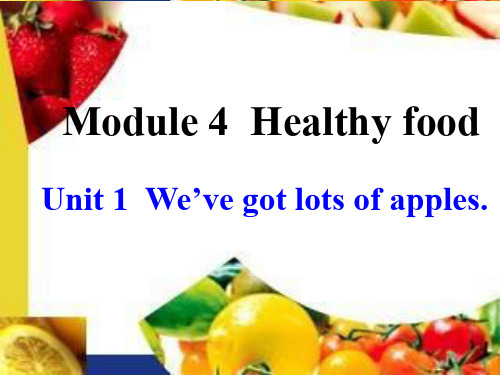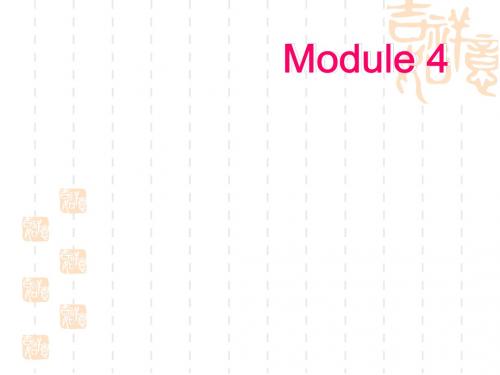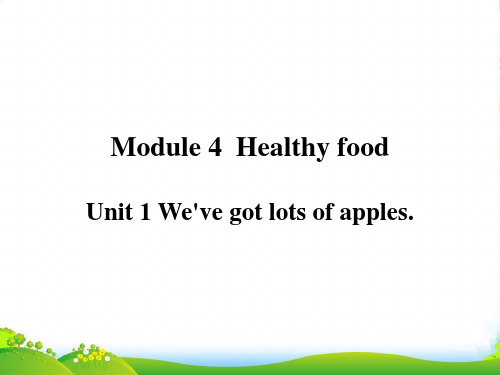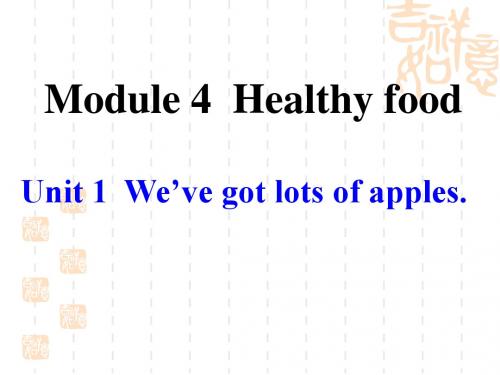外研版七年级上Module4 Unit1课件(共31张PPT)
合集下载
外研英语七年级上册Module 4Unit1(共23张PPT)

Lead in supermarket
Ms Yang
Nancy
make a shopping list
Pre-listening
fruit
candy meat
vegetables drink
an apple an orange a pear a strawberry a peach a watermelon
B: Yes, we have got some… A: Have we got any…? B: No, we haven’t. But we have got…
…….. …….. A: OK! Let’s go shopping together!
Proverb(谚语):
An apple a day keeps the doctor away.
While-listening Act.5.
1. Have they got any meat ? Yes, they have./ No, they haven’t.
2. Have they got any chocolate? Yes, they have./ No, they haven’t.
Food chocolate, __a_p_p_le_s_ meat, chicken,o_r_a_n_g_e_s_
Drink
_o_ra_n__g_e_j_u_ic_e_ coffee, cola, _t_e_a_
Post-listening:1.reading
Post-listening:2.practice
一日一苹果,医生远离我。
Homework
1.Read the dialogue after the tape and imitate(模仿).
Ms Yang
Nancy
make a shopping list
Pre-listening
fruit
candy meat
vegetables drink
an apple an orange a pear a strawberry a peach a watermelon
B: Yes, we have got some… A: Have we got any…? B: No, we haven’t. But we have got…
…….. …….. A: OK! Let’s go shopping together!
Proverb(谚语):
An apple a day keeps the doctor away.
While-listening Act.5.
1. Have they got any meat ? Yes, they have./ No, they haven’t.
2. Have they got any chocolate? Yes, they have./ No, they haven’t.
Food chocolate, __a_p_p_le_s_ meat, chicken,o_r_a_n_g_e_s_
Drink
_o_ra_n__g_e_j_u_ic_e_ coffee, cola, _t_e_a_
Post-listening:1.reading
Post-listening:2.practice
一日一苹果,医生远离我。
Homework
1.Read the dialogue after the tape and imitate(模仿).
外研英语七年级上册Module 4Unit1(共19张PPT)

candy fruit meat vegetables
apple
beef
orange
chocolate chicken
fruit candy
meat
carrot
potato
beans tomato
vegetables
tea juice coffee water mcoillak
Part 2 Sentence patterns
Healthy food
Unit1 We’ve got lots of apples.
Part 1 New words
an apple an orange
fruit
beans vegetables tomatoes
potatoes
carrots
meat
beef chicken
water
juice coffee
Betty’s mu否m定:句N。o, we haven’t.
Have we got any melons ?
Betty:
Yes, we’ve got some melons.
We haven’t got any apples.
Suppose (假如) a friend is coming for dinner.
I have got some apples.
“有;拥有”。 指某人有某物。
Have you got any apples? Yes, I have. No, I haven’t.
orange cola carrots juice tomato
chicken
beef potatoes milk
apples
You and your family are talking about the food
apple
beef
orange
chocolate chicken
fruit candy
meat
carrot
potato
beans tomato
vegetables
tea juice coffee water mcoillak
Part 2 Sentence patterns
Healthy food
Unit1 We’ve got lots of apples.
Part 1 New words
an apple an orange
fruit
beans vegetables tomatoes
potatoes
carrots
meat
beef chicken
water
juice coffee
Betty’s mu否m定:句N。o, we haven’t.
Have we got any melons ?
Betty:
Yes, we’ve got some melons.
We haven’t got any apples.
Suppose (假如) a friend is coming for dinner.
I have got some apples.
“有;拥有”。 指某人有某物。
Have you got any apples? Yes, I have. No, I haven’t.
orange cola carrots juice tomato
chicken
beef potatoes milk
apples
You and your family are talking about the food
外研英语七年级上册Module 4Unit1(共28张PPT)

3. They have got a lot of apples. T
4.TToonnyy’s’smmooththeerrhhaassn’gtogtostoamneyccoofffeeee.. F 5. TToonnyy hhaassng’ottgsootmaneycocloal.a. F
Watch and complete the table.
Have they got any milk? No, they haven’t.
Betty has got some juice. She has got some juice.
Betty
Tony hasn’t got any juice.
He hasn’t got any juice.
Tony
A: Mum, Tom is coming
×
for dinner. Have we
√ got any …?
B: Yes, we have .
A: Have we got any…?
B: No, we haven’t.
√ ×…
A: Let’s go shopping
for some.
×√
1)--Have you got any apples? --Yes, I have. --No, I haven’t.
They have got some potatoes. They have got some carrots. They haven’t got any milk. They haven’t got any chocolate.
(potato, carrot, milk, chocolate)
Have you got any apples? Yes, I have.
4.TToonnyy’s’smmooththeerrhhaassn’gtogtostoamneyccoofffeeee.. F 5. TToonnyy hhaassng’ottgsootmaneycocloal.a. F
Watch and complete the table.
Have they got any milk? No, they haven’t.
Betty has got some juice. She has got some juice.
Betty
Tony hasn’t got any juice.
He hasn’t got any juice.
Tony
A: Mum, Tom is coming
×
for dinner. Have we
√ got any …?
B: Yes, we have .
A: Have we got any…?
B: No, we haven’t.
√ ×…
A: Let’s go shopping
for some.
×√
1)--Have you got any apples? --Yes, I have. --No, I haven’t.
They have got some potatoes. They have got some carrots. They haven’t got any milk. They haven’t got any chocolate.
(potato, carrot, milk, chocolate)
Have you got any apples? Yes, I have.
外研版七年级英语上册Module4 Unit1课件(共58张PPT)

2. They have got a new lab. (变为一般 疑问句并补全肯定和否定回答) —______ Have they ______ got a new lab? —Yes, they have ________. / No, they ________. haven’t
按提示完成句子。 1. Let’s go shopping for food and _______ drink (饮料).
I. 根据句意选用have got 或has got填空。 1. We ___________ a big classroom. have got 2. Peter has ________ an old chair. got II. 根据各题后括号内的要求完成下列各 题。 1. Susan has got a white cat. (变为否定句) got Susan hasn’t ___________ a white cat.
2) any 可修饰可数名词复数或不可数名词, 常用于疑问句和否定句。 e.g. I can’t see any tea.
我没看见茶叶。
Do you have any friends at school?
你在学校有些朋友吗?
3) any也可用于肯定句,但表示的是 “任何一个”的意思,后常接可数名 词单数。 e.g. Any student can answer this question.
orange juice, coffee, cola, tea
Talk about Tony’s shopping.
— Has he got any chicken? — No, he hasn’t.
Pronunciation and speaking
七年级英语外研版浙江专用课件:Module 4 Unit 1(共38张PPT)

考向二 shop n.商店;店铺,近义词是store。
eg: We often buy bread at this shop. 我们经常在这个商店买面包。
考向三
固定搭配:shop for things买东西
go shopping去购物
do some shopping买一些东西
典例 我要去买一些食物。
chocolate,apples meat,chicken,oranges
at home
orange jhuoicme,ecoffee,
Foo
cola,tea
d
Drin
shop/ʃɒp/v. 逛商店;购物
eg: She always shops in that store. 她总是在那个商店购物。 考向一 shop作“购物”讲时,为不及物动词, 所以与宾语连用时,需加介词for,相当 于buy。 eg:She wants to shop for some new clothes. 她想去购买一些新衣服。
考向二 辨析let's和let us (1)Let's do sth.提出建议,劝说对方一同做某事。 eg:Let's go out for a walk. 咱们出去散步吧。(包括对方) (2)Let us do sth.让(或允许)我们做某事,即向对
方提出请求,对方并不参与。 eg:Let us have a rest. (你)让我们休息一下。(不包括对方)
即potatoes。 考向二 英语中以o结尾的名词变复数时,有些加es,
有些加s。本课学的potato和tomato加es。 但photo,radio,zoo等直接加s。
o结尾的名词变复数: 目前所学单词只有hero,Negro,tomato和potato 四个单词加es构成复数。可记忆为: 串联法:黑人英雄爱吃西红柿和马铃薯。 总结法:两人(hero,Negro),两菜(tomato,potato)。
外研版七年级英语上册Module4 Unit1 课件 (共21张PPT)

apple
carrot
potato
orange
chicken beans
tomato
4 Listen and check (√)the food and drink Betty and her mother have got.
apples beans beef carrots chicken coffee cola
Warm-up
歌曲欣赏
Ask and answer
What’s your favourite food?
fruit
vegetables
Let’s learn
pear
banana
orange
fruit
lemon
strawberry
apple
beans
potatoes
onion
vegetables tomato
Drink
Talk about Tony’s shopping. —Has Tony got any chicken? — No, he hasn’t . He has got….
Fill in the blanks
Tony and Tony’s dad go shopping for food meat and drink. They haven’t got any ______. They get some ________. They have got some chicken apples They haven’t got any _________ chocolate and ______. oranges They have got some ____________. _______. orange juice They have got some _________ for Mum. They coffee Cola is bad for haven’t got any _______. ______ cola Tony, so they have got some ____. tea
外研版英语七年级上册Module4 Unit1课件(共45张PPT)

Listen and check the food and drink Betty and her mother have got.
apples √ □ juice □ beans □ chicken √ □
milk □
carrots □ √ tea □ cola □
beef □ oranges √ □
可数名词
可数名词有单数和复数两种形式。指一 个人或一件事物时,用单数形式;指两个 或多个人或事物时用复数形式。名词由单 数形式变成复数形式的规则如下: 1. 一般的名词词尾直接加-s 。如:
book → books
room → rooms
house → houses day → days
2. 以s, ss, ch, sh, x 结尾的名词,在词尾 加-es 。如: bus → buses glass → glasses watch → watches dish → dishes box → boxes 3. 以“辅音字母+y”结尾的名词,要先将y改 为i再加-es。如: city → cities body → bodies factory → factories
Listen and decide true or false. 1. They’ve got some milk. × 2. They haven’t got any meat. × 3. They haven’t got any coffee. × 4. They have got some cola. ×
potatoes □ coffee □ √ water □ √ tomatoes □
Look at the video and answer the question.
新外研版七年级英语上册Module4 Unit1 精品课件(共23张PPT)

Module 4 Healthy food Unit 1 We’ve got lots of apples.
I have got …. He/She has got….
an apple
two apples some apples
an orange
three oranges some oranges
apples
beans
√
juice
milk
Pay attention to “have got” and “haven’t got”.
beef
carrots
oranges
potatoes
√ √
chicken √ coffee √ cola
tea water
tomatoes √
Tony and his dad are talking about going shopping. Let’s listen to the dialogue and complete the table.
meat, chicken, oranges orange juice, coffee, cola, tea
Work in groups (ABCD) A: Has he got any chocolate? B: Yes, he has.
√ √ × ×
Things Tony’s family has got at home Food Drink
×
×
√
Lingling and her mother are going shopping. Now they’re making a shopping list.
Work in pairs 4. Listen and check (√) the food and A: They have and got…. drink Betty her mother have got. B: They haven’t got….
I have got …. He/She has got….
an apple
two apples some apples
an orange
three oranges some oranges
apples
beans
√
juice
milk
Pay attention to “have got” and “haven’t got”.
beef
carrots
oranges
potatoes
√ √
chicken √ coffee √ cola
tea water
tomatoes √
Tony and his dad are talking about going shopping. Let’s listen to the dialogue and complete the table.
meat, chicken, oranges orange juice, coffee, cola, tea
Work in groups (ABCD) A: Has he got any chocolate? B: Yes, he has.
√ √ × ×
Things Tony’s family has got at home Food Drink
×
×
√
Lingling and her mother are going shopping. Now they’re making a shopping list.
Work in pairs 4. Listen and check (√) the food and A: They have and got…. drink Betty her mother have got. B: They haven’t got….
- 1、下载文档前请自行甄别文档内容的完整性,平台不提供额外的编辑、内容补充、找答案等附加服务。
- 2、"仅部分预览"的文档,不可在线预览部分如存在完整性等问题,可反馈申请退款(可完整预览的文档不适用该条件!)。
- 3、如文档侵犯您的权益,请联系客服反馈,我们会尽快为您处理(人工客服工作时间:9:00-18:30)。
many 许多,用来修饰可数名词复数, 例如: Are there many students in his class? 他的班上有很多学生吗? I haven’t got many English books. 我没有很多英语书。
2
much许多 用来修饰不可数名词
如: We haven’t got much work to do. 我们没有太多工作要做。 Is there much milk in the bottle? 瓶子里有很多牛奶吗?
apple orange chocolate
beef chicken
carrot potato beans tomato
tea juice water milk cola
coffee
Listen and check (√)the food and drink Betty and her mother have got. apples √ beans beef carrots chicken√ coffee √ cola juice milk oranges √ potatoes √ tea tomatoes √ water
可修饰可数名词复数或不可数名词,常 用于疑问句和否定句。如:
I can’t see any tea. 我没看见茶叶。 Do you have any friends at school? 你在学校有些朋友吗?
4
但在表示建议,反问,请求的疑问句中,或
期望得到肯定回答时,多用some而不用any。 如:Would you like some coffee?
3
lots of = a lot of 许多它既可以修饰可数
名词,相当于many;也可以修饰不可数
名词,相当于much,例如: There are lots of apples on the desk. 桌子上有很多苹果。 We have got lots of meat at home. 我们家里有许多肉。
Pronunciation and speaking.
Listen and repeat.
drinks apples potatoes vegetables tea tomato water bad food idea
Listen and choose
or
.
1. apples 2. beans
3. drinks 4. potatoes
Listen again and complete the table.
Things Tony’s family has got at home Things Tony’s family hasn’t got at home
Food
Drink
chocolate, apples
meat, chicken, oranges orange juice, coffee, cola, tea
4
too much 和 too many 的用法:
too much 和 too many 都表示“太多”。
Language points
1
some和any的用法
some和any 既可以修饰可数名词又可以修 饰不可数名词, some常用在肯定句中, 而 any则常用在否定和疑问句中。所以, some 和 any 的区别在于: some和any 的用法主要 是考虑用在肯定句、疑问句还是否定句中, 与名词的可数与否无关。
2
some的用法: some意为“一些”,可作形 容词和代词。它常修饰可数名词复数。
如:some books 一些书,
some boys 也可修饰不可数名词:
some water 一些水,some tea 一些茶叶,
3
any的用法: any意为“任何一些”,它也
fruit
candy
√
meat
vegetables
drink
Label the food and drink in the pictures with the words from the box.
apple beans beef carrot chicken chocolate coffee cola juice milk orange potato tea tomato water
外研七年级上册
Module 4 Healthy food
Unit 1 We’ve got lots of apples.
meat
Label the food in the pictures with the words from the box.
candy fruit meat vegetables drink
你要不要来点咖啡?
How about some fruit juice?
来点水果汁如何?
5
当any表示“任何”的意义,起强调作用时, 它可以用在肯定句中;
如:Any student can answer this question.
任何学生都可以回答这个问题。
1
many, much, lots of 的用法:
Talk about Tony’s shopping. — Has he got any chicken? — No, he hasn’t.
Learning to learn
Remember! Write words you learn in groups. fruit: apple orange meat: beef chicken fish Let’s go shopping for ... How about … Good idea!
beans drinks
apples potatoes
Make a shopping list. Student A: Make a list of things you need. Student B: Make a list of things you’ve got. Now ask and answer. — Have we got any …? — Yes, we have. We’ve got some… / No, we haven’t.
2
much许多 用来修饰不可数名词
如: We haven’t got much work to do. 我们没有太多工作要做。 Is there much milk in the bottle? 瓶子里有很多牛奶吗?
apple orange chocolate
beef chicken
carrot potato beans tomato
tea juice water milk cola
coffee
Listen and check (√)the food and drink Betty and her mother have got. apples √ beans beef carrots chicken√ coffee √ cola juice milk oranges √ potatoes √ tea tomatoes √ water
可修饰可数名词复数或不可数名词,常 用于疑问句和否定句。如:
I can’t see any tea. 我没看见茶叶。 Do you have any friends at school? 你在学校有些朋友吗?
4
但在表示建议,反问,请求的疑问句中,或
期望得到肯定回答时,多用some而不用any。 如:Would you like some coffee?
3
lots of = a lot of 许多它既可以修饰可数
名词,相当于many;也可以修饰不可数
名词,相当于much,例如: There are lots of apples on the desk. 桌子上有很多苹果。 We have got lots of meat at home. 我们家里有许多肉。
Pronunciation and speaking.
Listen and repeat.
drinks apples potatoes vegetables tea tomato water bad food idea
Listen and choose
or
.
1. apples 2. beans
3. drinks 4. potatoes
Listen again and complete the table.
Things Tony’s family has got at home Things Tony’s family hasn’t got at home
Food
Drink
chocolate, apples
meat, chicken, oranges orange juice, coffee, cola, tea
4
too much 和 too many 的用法:
too much 和 too many 都表示“太多”。
Language points
1
some和any的用法
some和any 既可以修饰可数名词又可以修 饰不可数名词, some常用在肯定句中, 而 any则常用在否定和疑问句中。所以, some 和 any 的区别在于: some和any 的用法主要 是考虑用在肯定句、疑问句还是否定句中, 与名词的可数与否无关。
2
some的用法: some意为“一些”,可作形 容词和代词。它常修饰可数名词复数。
如:some books 一些书,
some boys 也可修饰不可数名词:
some water 一些水,some tea 一些茶叶,
3
any的用法: any意为“任何一些”,它也
fruit
candy
√
meat
vegetables
drink
Label the food and drink in the pictures with the words from the box.
apple beans beef carrot chicken chocolate coffee cola juice milk orange potato tea tomato water
外研七年级上册
Module 4 Healthy food
Unit 1 We’ve got lots of apples.
meat
Label the food in the pictures with the words from the box.
candy fruit meat vegetables drink
你要不要来点咖啡?
How about some fruit juice?
来点水果汁如何?
5
当any表示“任何”的意义,起强调作用时, 它可以用在肯定句中;
如:Any student can answer this question.
任何学生都可以回答这个问题。
1
many, much, lots of 的用法:
Talk about Tony’s shopping. — Has he got any chicken? — No, he hasn’t.
Learning to learn
Remember! Write words you learn in groups. fruit: apple orange meat: beef chicken fish Let’s go shopping for ... How about … Good idea!
beans drinks
apples potatoes
Make a shopping list. Student A: Make a list of things you need. Student B: Make a list of things you’ve got. Now ask and answer. — Have we got any …? — Yes, we have. We’ve got some… / No, we haven’t.
